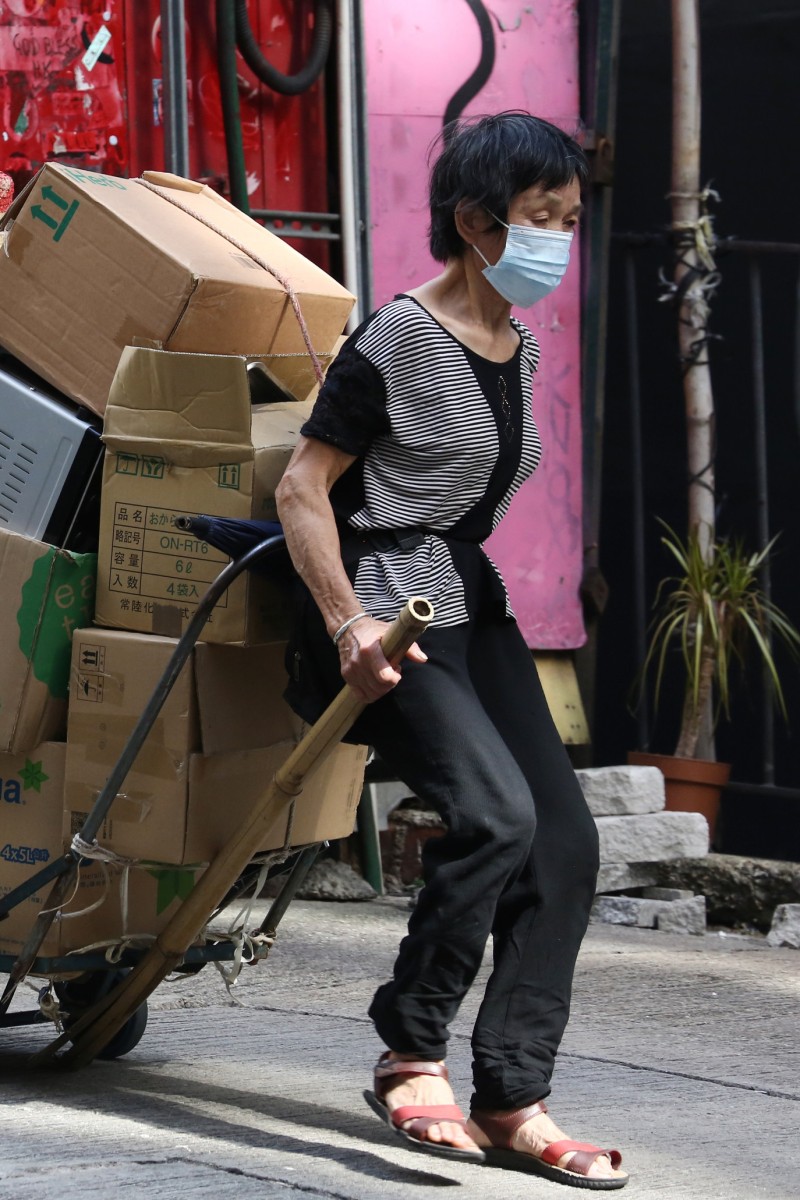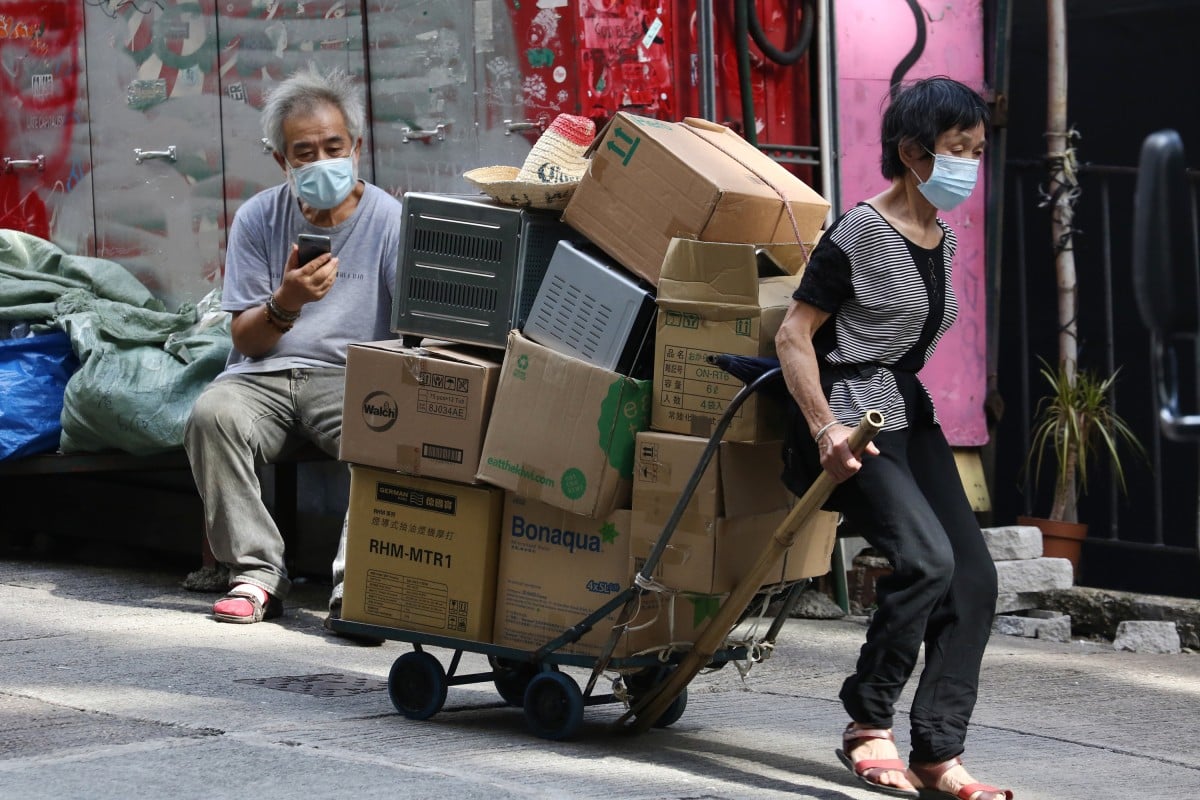
- The city’s minimum pay rate has not changed since it was last raised to HK$37.50 an hour three years ago, with authorities citing Covid-19’s effect on the economy
- The figure is reviewed every two years, but the Society for Community Organisation (SoCO) is urging officials to conduct the process annually to keep up with inflation
 According to Hong Kong’s annual poverty report released last year, about 1.65 million people were living in poverty, the highest number in 12 years. Photo: Jonathan Wong
According to Hong Kong’s annual poverty report released last year, about 1.65 million people were living in poverty, the highest number in 12 years. Photo: Jonathan WongHot Topics takes an issue being discussed in the news and allows you to analyse different articles and viewpoints on the subject. Our questions encourage you to examine the topic in-depth – they can be used on your own or with a friend.
Context: Hong Kong minimum wage stuck at HK$37.50 an hour
Last February, the Hong Kong government announced the city’s statutory minimum wage would be frozen at HK$37.50 (US$4.84) an hour. Authorities cited the struggling economy battered by the coronavirus pandemic.
The decision was revealed last year after a review by the Minimum Wage Commission. The commission is made up of representatives from business and labour, as well as government officials and academics.
Secretary for Labour and Welfare Law Chi-kwong said a “majority consensus” was reached to keep the minimum wage at its current level. “The commission has considered that Hong Kong’s economy is in a deep recession and the unemployment rate remains high,” he said last year.
Statistics from the commission showed that 14,300 employees only received the minimum wage in May and June of 2021. Most of these low-wage workers were in the property management, retail and catering industries.
One of them is Chu, a 64-year-old security guard who lives with his brother on a public housing estate. Chu said he worked 10 hours a day, 26 days a month and received a monthly salary of HK$10,000, meaning he only earned HK$38.40 per hour on average.
“I need to spend HK$3,000 to HK$4,000 on food, around HK$2,000 on monthly rent, and another HK$1,000 to HK$2,000 on other necessities,” Chu said.
The security guard added that he found it especially hard to keep up with the rise in food prices. “Back in 2009, I could dine at a restaurant and enjoy rice with siu mei for around HK$20. Now it costs over HK$50,” he said.
Explainer: One-fifth of Hongkongers live in poverty. Here’s what you need to know
“I have not thought about retiring as I do not have enough savings. The Comprehensive Social Security Assistance Scheme only provides a little financial aid, so I would rather just keep working,” he said, referring to the government’s monthly allowances for the needy.
Chu said he believed he would need to earn at least HK$50 per hour to get by without government subsidies.
“I did not ask them [my employers] to raise the rate as I worry they may just find other people to replace me,” explained the security guard.
Staff writers
Question prompts:
-
What is the purpose of setting a minimum wage? Explain using Glossary and your own knowledge.
-
What groups benefit from the government’s decision to freeze the minimum wage? What groups are likely to be negatively affected? Explain with reference to Context and your own knowledge.
-
Last year, Law said minimum wage was not the only way to tackle poverty as welfare policies were in place for low-income workers.
To what extent do you agree with him? Explain using Context.
Why cleaners are teaching students about responsible waste disposal
Cartoon
Question prompts:
-
Which groups mentioned in Context are represented by the chef and the man leaving the restaurant?
-
In reality, what might happen if a chef asked to be paid above minimum wage? Use Context to support your answer.
Hot topics: Hong Kong freezes domestic worker wages for second straight year
News: Hong Kong NGO urges government to raise minimum wage, calls for annual review to keep up with inflation
A concern group has urged the government to raise Hong Kong’s minimum wage to at least HK$50 per hour as it has remained unchanged for the last three years, adding that the figure should be reviewed annually, rather than every two years, to keep up with inflation.
The Society for Community Organisation (SoCO) said that although the current minimum wage of HK$37.50 per hour marked an increase of 33.9 per cent since its introduction in 2011, the consumer price index had soared close to 40 per cent in the past 12 years.
“We believe the city’s minimum wage should be at least HK$50 per hour, so we can ensure that the minimum monthly income of citizens can be over 60 per cent of the median monthly one-person household expenditure of HK$16,000,” Ng Wai-tung, a community organiser at SoCO, said last month.
“In the long term, we hope the minimum wage can be further increased to HK$58 per hour, so the minimum monthly income can be over 60 per cent of the median monthly one-person household income of around HK$18,000.”
The practice of reviewing the base pay once every two years was too favourable to management, Ng said. The current wage level was set in 2019 and has remained unchanged since then.
He suggested that the government should review the minimum wage every year to keep up with inflation, stressing that authorities should have more objective standards when assessing the pay level, as well as factoring in average income and expenditure.
The review should also include a poverty impact assessment to better understand how the wage level would help reduce the city’s poverty rate, the community organiser said.
SoCO’s recommendations came as the commission completed a public consultation on the wage review on May 31. The independent statutory body will submit its recommendation to the government in October.
Staff writer
Question prompts:
-
Why might income and expenditure be important for determining minimum wage in Hong Kong? Use Glossary and News to explain.
-
Why might Ng have said that the practice of reviewing the city’s minimum wage once every two years was too favourable to management? Explain with reference to Context and News.
What it’s like for a teen from a poor family caring for diabetic father
Issue: City’s labour minister dismisses public appeal for yearly review of Hong Kong’s minimum wage as ‘unfeasible’
Hong Kong Secretary for Labour and Welfare Law Chi-kwong has dismissed calls for an annual review of the city’s minimum wage, calling it “unfeasible” as it would only be possible if the existing two-year process underwent significant reforms.
Law said that although an annual review was possible at a legislative level, all the other necessary work involved, such as research, analysis and consultation, under the existing mechanism could only be completed within the framework of a two-year process.
“To conduct an annual review, the process of research, analysis and consultation would have to be greatly compressed, or the statutory minimum wage level would have to be adjusted by an equation instead,” he wrote in his blog last month.
“The former needs a technical adjustment under the existing framework, while the latter requires a major surgery to overturn the current framework and reestablish social consensus,” he added.
Law said now was not the best time to discuss adopting an annual practice because a new review was already under way, but added that the issue could be revisited later.
The labour minister also said that the minimum wage was raised from HK$28 per hour in 2011 to HK$34.50 per hour in 2017. This was an increase of 23.2 per cent, which was higher than the city’s inflation of 20.4 per cent during the same period.
He added that the 8.7 per cent rise to HK$37.50 in 2019 was the largest increase since the minimum wage was introduced.
Hong Kong more unequal, less free as Carrie Lam leaves office
The commission needed to balance how to prevent extremely low wages as well as reduce the loss of low-income jobs, Law said. The body also had to consider how to maintain Hong Kong’s economic development and competitiveness.
Meanwhile, the Labour Department said the review mechanism factored in a series of indices including the overall economic situation, competition in the labour market, opinions in society and discussions by the Minimum Wage Commission. It also said the commission had no fixed position on amending the wage rate, adding it would consider different views with an open attitude.
Staff writers
Question prompts:
-
What evidence did Law use to show the current minimum wage is enough? Compare this to Ng’s evidence in News that it is insufficient. To what extent do you agree with each side?
-
Using Context, News and Issue, explain ONE argument for reviewing the city’s minimum wage every year and ONE against it.
Comprehensive Social Security Assistance Scheme :
a welfare programme in Hong Kong that provides payments to residents whose income cannot meet their basic needs
Consumer price index :
measures how the price of goods and services changes over a period of time
Hong Kong’s statutory minimum wage :
the lowest wage per hour that a worker may be paid, as mandated by law. The city introduced its minimum wage in 2011 to protect low-wage workers, initially setting the amount at HK$28 per hour.
Inflation :
increase in prices of goods and services in an economy, causing a reduction in value of the same amount of money. Inflation can occur when prices rise because of increases in production costs, such as raw materials and wages, or when demand surges for goods and services.
Median :
the middle value in a list ordered from smallest to largest
Monthly one-person household income :
the amount earned every month by those living alone. According to the International Labour Organization, median wages are a good point of reference for minimum pay rate in places with high income inequality.
Monthly one-person household expenditure :
the spending every month by those living alone to meet their needs, such as food, clothing, housing and transport
Poverty rate :
percentage of people whose income falls below the minimum level for a basic standard of living. Based on Hong Kong’s Poverty Situation Report for 2020, 23.6 per cent of its population lived in poverty.
Unemployment rate :
percentage of the total labour force that do not have a job but are seeking work. Hong Kong’s unemployment rate is at a one-year high of 5.4 per cent, according to the Census and Statistics Department.
